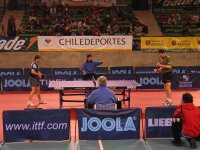This user has no status.
This user has no status.
Well-Known Member
I'm making this thread to discuss momentum during a set of games.
I noticed that If I win the first two games of a set pretty handily (11-5ish or better on both) I tend to let up on the next game as a way of conserving energy for future games. This is a mistake, as once your opponent builds a bit of momentum you can become steamrolled quite easily. This is especially true when you feel as though you are better than your opponent. When you feel as though you're better it can be hard to take the game seriously and give your real shots.
Anyway here's something I noticed about momentum against a player of equal level/ frequent playing partners. I noticed that if I lose the first game or even the first two, I tend to win the set by winning the next 3. The same happens with the opponent if I win the first two. I think the reasoning for this could be because If I'm winning, I'm going to keep doing what's working. My opponent is then going to adjust to what I was doing and it will no longer work quite as well. Then, comes the mental block I face, firstly, I need to realize that my opponent adjusted to what I was doing. Secondly, I have to STOP doing that stroke! It's easy to tell yourself, "oh I was beating him earlier with this, maybe if I can hit it like I was earlier, that would work".
So In this situation I find it more difficult to be the one winning in the beginning opposed losing in the beginning.
Thoughts and other opinions on momentum and your experiences?
I noticed that If I win the first two games of a set pretty handily (11-5ish or better on both) I tend to let up on the next game as a way of conserving energy for future games. This is a mistake, as once your opponent builds a bit of momentum you can become steamrolled quite easily. This is especially true when you feel as though you are better than your opponent. When you feel as though you're better it can be hard to take the game seriously and give your real shots.
Anyway here's something I noticed about momentum against a player of equal level/ frequent playing partners. I noticed that if I lose the first game or even the first two, I tend to win the set by winning the next 3. The same happens with the opponent if I win the first two. I think the reasoning for this could be because If I'm winning, I'm going to keep doing what's working. My opponent is then going to adjust to what I was doing and it will no longer work quite as well. Then, comes the mental block I face, firstly, I need to realize that my opponent adjusted to what I was doing. Secondly, I have to STOP doing that stroke! It's easy to tell yourself, "oh I was beating him earlier with this, maybe if I can hit it like I was earlier, that would work".
So In this situation I find it more difficult to be the one winning in the beginning opposed losing in the beginning.
Thoughts and other opinions on momentum and your experiences?











